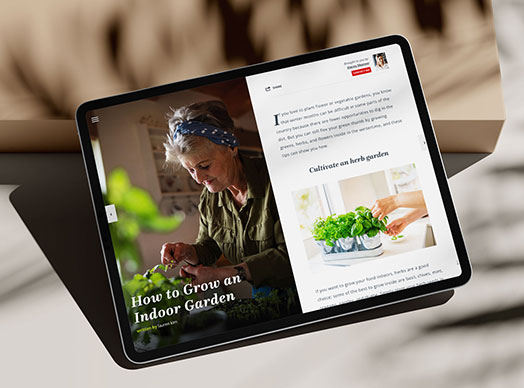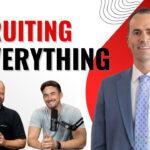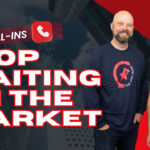Ep. 135: James Carbary- How to Find Your Perfect Client Through Podcasting
James Carbary is the founder of Sweet Fish Media, a podcast agency for B2B brands, and he hosts his own podcast called B2B Growth—a show dedicated to helping B2B executives achieve explosive growth. He has been a contributor for the Huffington Post, Entrepreneur, and Business Insider, and is the author of Content-Based Networking: How to Instantly Connect With Anyone You Want to Know.
In this episode of Stay Paid, James explains the basics of starting your own podcast, and how content collaboration can bring immense benefits to any sales-based business.
Key Points:
- Content collaboration is one of the strongest relationship building tools for your business
- Building friendships through your business will help you grow it much quicker
- Focus on partnerships with businesses you want to work with, not on growing your audience
Q: Tell us a little bit about yourself.
It started with a little bit of a crazy story. I graduated college and my roommate at the time’s brother-in-law won a sweepstakes through the old phone company Alltel, and it was one of those deals where you text like 1511 to 1-800-Alltel and you can win an all-expense paid trip to a professional football game of your choice with you and nine of your friends and you think no one actually wins those things, but it turns out people actually do. And he was one of them. And he reached out to his brother-in-law and asked if he had any buddies who would want to go on this, and of course my roommate didn’t have any problems finding nine guys to get on a private jet and hang out with Barry Sanders in New York City.
And when I got to New York City there was a guy there who was running all of the logistics for the trip. He had chartered the jet, the limo bus taking us around the city, he even watched the game with us in the suite. And I just hit it off with this guy, his name was Jeff, and it turned out he was the CEO of this global logistics company. So I connected with this guy, not thinking anything is really going to happen. And I go on my merry way, we get back on the private jet and go back to Oklahoma that night. And about a year and a half later I stayed connected with him and he called and said, “James the guy running the helicopter division of our business just left, and he asked if I wanted to move to Orlando.”
So that story I say to illustrate that one relationship can change the entire trajectory of your life. Had I not worked for Jeff for three years, I wasn’t one of those guys who sold baseball cards in elementary school or had a lemonade stand. I didn’t know what entrepreneurship was. That’s just not my story. But getting to work for Jeff for three years, I got to see an entrepreneur in the trenches and because of that I ended up pursuing entrepreneurship. And because he moved me to Orlando that’s where I met my wife. She’s a dolphin trainer at Disney World. So I get to do what I love doing with someone who I love doing it with because of this single relationship with Jeff.
As I started my business, we started out as a blog writing agency and shifted into a podcast agency, I thought, “What would be a way to reverse engineer relationships with the exact people I want to know?” And that’s how I stumbled into this idea of podcasting being a way to do content collaboration with the people who I want to know. So when we started our show B2B Growth, I said if VPs of marketing at B2B SAAS companies with fifty plus employees are the people that buy from us I should just interview VPs of marketing at B2B SAAS companies on this show. And it’s worked out incredibly well for us. Every single guest we’ve had on the show is an ideal buyer for us. This strategy of using content collaboration as a way of building relationships works exceptionally well in that area.
This content based networking thing has radically transformed my life. It’s allowed me to build a seven-figure business from the ground up. It wasn’t without work. It’s not one of those get rich quick—we’ve been at this for over half a decade. But it works. And one of the other things I like is if you’re not into podcasting, you don’t have to be. You can do it with a blog series, with a video series on LinkedIn. Content collaboration is content collaboration, I just happen to think podcasting is the easiest way to do it. But I think you can do it in a lot of different ways. I just think if more people knew about this strategy, they’d have a lot more fun doing business.
Q: What role does Sweet Fish Media play in helping your clients create a podcast?
We source all of the equipment, and we help them find their guests. We act as a producer for their show. We’re interacting with all their guests pre-interview and figuring out what kinds of questions they want to ask. And then we do all of the post production and help them turn it into video content or written content on LinkedIn and blog content they can use on their site. We kind of do soup to nuts. But we’re also working with companies with a larger budget. So folks who have at least fifty employees and they can afford to work with a service like ours. But when I hear people say, “Ugh, I can’t do this, it’s overwhelming.” You can do this stuff on things like an app called Anchor. As much as that’s shooting my own business in the foot, if you don’t have budget to work with a production team like ours, don’t let that stop you because you could literally start a podcast tomorrow. If you’re working at a big insurance company or a real estate company and you don’t think that your boss is going to let you do this, just do it on your own and do interviews. And your boss will want you doing it for the company before too long because he or she will see you become the top producer on your team. When they start to see that the people you’re interviewing is building relationships that turns into revenue for the business.
Q: What tips do you have for content that small business owners can do?
I love when folks like our client that’s a financial advisory company, what they did with their show was having a show that’s local where you can do the interviews in person, that is a super ninja move. It’s not something that I necessarily can do because I’m in Orlando and our clients are in San Francisco, Boston, New York, but if you sell locally and can show up to someone’s office and do the interview there, the equity you’re going to build and the speed you’ll be able to build trust with somebody because you’re in the same room creating content with them is so beneficial. I literally think if you’re in the finance space and want to work with entrepreneurs who have been in business for five plus years because you know if they’ve made it past five years they likely have the kind of money you want to manage, you can literally look for business owners in your area that meet that qualification and reach out and say we’re doing a podcast and we’d love to feature you on our show, are you up for it? You’d be shocked how many people want to share their story.
In the book, I talk about the reason Oprah got to the level of fame that she got is not because of her own story, it’s because she learned how to share her spotlight on other people and lift them up. When we change our mindset as people trying to sell a product or service from, “I am someone who sells insurance, or I am someone who sells real estate” to “I am someone who shares the stories of the people who I want to work with,”you start to be seen as a journalist in your area as opposed to someone who sells something. That makes you a lot more attractive, people will want to have more conversations with you. The other thing it leads to is genuine friendship and relationships because you’re spending the time to hear their story and through that process you’re building trust, and that person is going to want to work with you. Something I talk a lot about in the book is friends want their friends to win, and if you go through this process on collaborating on a piece of content it might seem like a lot of time to spend, but I guarantee you’re spending a lot more time cold calling or knocking on doors with people who want nothing to do with you. This opens up way more conversations way quicker. I don’t think we use the term friendship in business enough.
Q: What are some of the technical strategies for creating a podcast? And how can business owners build an audience?
I see a lot of people who want to do content based networking, and if your goal is to build relationships with people you want to do business with, those people are likely not going to care about how big the audience is because they’re not being asked to be on podcasts. I see so many people who want to interview all these people, but for really executing the content based networking strategy, if you’re reaching out to people in your community nobody is asking the guy who owns the bicycle shop down the street to be on a podcast.
First I would say, get it out of your head that most people care about audience size. The bulk of the people you want to do business with are not the Tom Ferry’s of the world, they’re the decision makers in your industry who really do have valuable content to share with your listeners, they’re just not being asked to share that content.
And in terms of growing an audience, I’ve found the biggest hack for that is doing collaborations with other podcasts that are serving a similar audience. So if you can find a show that is reaching about the same amount of people that your show is reaching and you can reach out and say, “Hey, for the next month if we promote your show will you promote our show?” It gets you connected with other podcasters in the space and there is no better way to promote your podcast than on another podcast that has people listening to it that would also like your show. That’s something we see all the time that works really well.
Q: You have a podcast that comes out daily. How much time a week are you spending on that podcast?
Honestly, I think people can pull off a daily podcast much easier than they think. If they’re allowing the guest to set the tone for the content, before I had Logan take over B2B Growth, I had up to episode 800 or something. So there were days when I was doing seven, eight, nine interviews in a day. The benefit was, I’m doing these interviews but I’m meeting VPs of marketing who could use our service. There’s no better use of my time than talking to my ideal clients about what their pains are, how they’re solving their challenges, because it gave me the opportunity to talk to them in a way that they’ll respect my strategic thinking and see me as a valuable resource.
For us, we had an audio engineer, we weren’t doing a lot of copywriting for those episodes, and found someone who could edit the audio. And I’d reach out to guests and ask what would be a really granular topic they’d be interested in talking about related to B2B marketing, they would tell me what that was, and in the first five minutes of that interview I would ask what would be three to five takeaways that they would want to make sure the listeners should know. I would take notes as they were talking and say how the interview would go. I literally did hundreds of episodes that way and it would allow me to stack those relationships. Then I’m connecting with them on LinkedIn after the interview, they’re subscribing to the show so they’re hearing our show and seeing our content.
Q: What are some other content based networking strategies you coach people on?
In the book I talk about a couple fictional stories of how it could work, because we’re primarily working with B2B SAAS companies. One of the stories I talk about is, if you want to be a chef, you go to school for that, get out of school, but you’re up against all these other people with the same credentials but you don’t have much to show for it. I guarantee if you started some kind of Instagram series where you went into some kitchens and said, “Hey, I want to share some of your dishes and your restaurant and head chef on my Instagram,” I don’t think you’d have a hard time getting a few restaurants in your area to say yes. Through that process of doing interviews and taking pictures and documenting what the recipes are, because it’s good for the restaurant and gives them additional exposure, you’re getting the value of networking with this head chef who can hire you.
A friend of mine is a sophomore or junior at South Carolina University, he wants to be a football coach. He’s been very fortunate that he’s now an undergraduate assistant coach for the South Carolina football team. And I told him, if you want to be a head coach, you know that this is a relationship business. You know all of these coaches are getting hired because of who they knew on staff at Florida or Georgia or wherever. So I said if you start a podcast and interviewed every assistant coach that would say yes to you who is on staff at a college and ask them what their journey has been to become a college football coach, you’re going to get a lot of people to say yes to you, and you’ll stack all of these relationships with coaches who could give you a shot. So this works way outside of the traditional business model. It works exceptionally well for insurance, real estate, but I think it’s really a game changer for college students, people looking to get elected to office—there’s lot of different ways.
Q: How do you track results?
It’s really simple. You’re going to have a list of people you’ve had on the show, so if after a year you’re scrolling through and you’ve had 52 guests, you can look and say, “How many of these people have I done business with?” And when I look back at B2B Growth, there’s no doubt that it is worth the expense of doing it. So when you’re selling something that is of high lifetime value, like financial or insurance or real estate, those relationships are worth a lot of money to you and I think this approach allows you to stack those relationships. I get cautious of people measuring it too meticulously, because you get to the point where you’re just looking at these people as leads or opportunities and not as humans, and that, to me, bastardizes the entire process. It makes it ineffective. It’s not rocket science, but you have to be intentional about doing it.
Q: What are some of the routines you’ve implemented in your life that have driven success for you?
The routine for me is empowering the other people on our team, specifically our leadership team. I’ve worked for leaders who have been not very trusting or empowering to me, and it didn’t bring out the best work. I’ve tried to learn from that and apply that here as a practice of my leadership. I’ve said I’m going to empower and trust them, because I’m very clear about our values and where we’re trying to go. In doing so, everyone is on the same page and I can empower them to take the business forward so I’m not the only one taking that on my shoulders. That’s been the ultimate habit that has fostered a lot of our success.
Q: What are your company’s core values?
Our number one value is to love people well, our second one is to never stop learning, and our third one is own no result. I read a book called The Advantage by Patrick Lencioni, and it was insane, we had seven core values before I read that book—I couldn’t even tell you what they were and I wrote them. So we read that book, slimmed it down to three, and now our entire team, I’d put a good chunk of money on the fact that all 18 employees could tell you what our core values are because we talk about them over and over.
Connect with James:
Action Items:
- Think about the impact you’re trying to make and the people you want to work with when you’re doing content collaboration.















 Soundcloud
Soundcloud iHeart Radio
iHeart Radio Spotify
Spotify Spotify
Spotify


